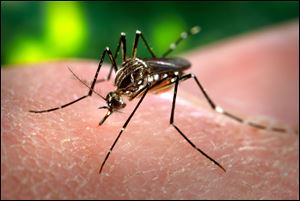
Mosquitoes, ticks, fungi, other pests out early
Mild winter allowed irritants to survive
3/26/2012
Mosquitoes found ample breeding spots after rainfall left pools of water.
Not much more than a year after Bob Jacksy was shoveling snow, the Metroparks of the Toledo Area naturalist started shooing mosquitoes instead.
That first mid-March encounter is only one of several instances of what a mild winter is bringing on early in the form of pests and other issues that can affect health.
Besides pollen from flowers and trees blooming early and affecting those who are allergic, for example, an abundance of fungus that didn’t die over the winter remains on the ground and in trees, Mr. Jacksy said.
“That’s a major one because it didn’t get a freeze back this winter,” Mr. Jacksy said. “I think that’s going to be a big one.”
Ticks, like mosquitoes, can carry disease, and black-legged ticks had plenty of sunny days to remain active this year. Common American dog ticks, which normally aren’t found until April, could be found last week, said Glen Needham, associate professor of entomology at Ohio State University.
“The ticks were out earlier than normal,” Mr. Needham said.
Still, temperatures are cooling, which could change the tick scenario, Mr. Needham said.
Last year, when spring was cool and wet, dog ticks were active into August instead of becoming scarce as usual in July, he said.
To ward off ticks, including the black-legged kind that can carry Lyme disease, people should wear insect repellent with at least 30 percent DEET, which is higher than needed for mosquitoes, Mr. Needham said. They also should spray clothing with permethrin, although the synthetic chemical can be hard to find in Ohio, he said.
It’s an especially good idea to spray insect repellent on socks and shoe tops, said the Metroparks’ Mr. Jacksy. Pets, meanwhile, already should be protected against both ticks and fleas, he said.
The Toledo Area Sanitary District, which provides mosquito control throughout Lucas County and is funded through property taxes, started treating larvae two weeks ago, said Lee Mitchell, sanitary district biologist.
Rainfall the past month is more of a concern than a mild winter because mosquitoes breed in standing water, Mr. Mitchell said.
Typically, the district does not budget to start fogging for adult mosquitoes until mid-May or so, Mr. Mitchell said. That way, the district does not run out of insecticide, which is needed in August when mosquitoes carrying West Nile Virus are especially of concern, he said.
But this year spraying for adult mosquitoes, normally done from late May through early September, probably will have to start early, he said.
“We’re expecting a very busy season,” Mr. Mitchell said. “We’re trying to hold back on the adults until it’s the middle of April.”
Contact Julie M. McKinnon at: jmckinnon@theblade.com or 419-724-6087.